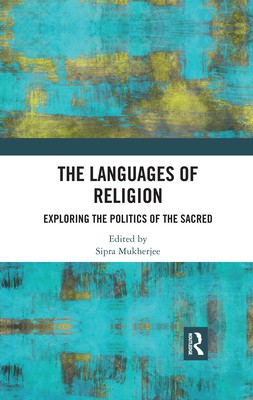
- We will send in 10–14 business days.
- Publisher: Routledge Chapman & Hall
- ISBN-10: 0367479214
- ISBN-13: 9780367479213
- Format: 13.7 x 21.3 x 2 cm, softcover
- Language: English
- SAVE -10% with code: EXTRA
The Languages of Religion (e-book) (used book) | bookbook.eu
Reviews
Description
This book analyses the power that religion wields upon the minds of individuals and communities and explores the predominance of language in the actual practice of religion. Through an investigation of the diverse forms of religious language available -- oral traditions, sacred texts, evangelical prose, and national rhetoric used by 'faith-insiders' such as missionaries, priests, or religious leaders who play the communicator's role between the sacred and the secular -- the chapters in the volume reveal the dependence of religion upon language, demonstrating how religion draws strength from a past that is embedded in narratives, infusing the 'sacred' language with political power.
The book combines broad theoretical and normative reflections in contexts of original, detailed and closely examined empirical case studies. Drawing upon resources across disciplines, the book will be of interest to scholars of religion and religious studies, linguistics, politics, cultural studies, history, sociology, and social anthropology.
EXTRA 10 % discount with code: EXTRA
The promotion ends in 18d.11:46:56
The discount code is valid when purchasing from 10 €. Discounts do not stack.
- Publisher: Routledge Chapman & Hall
- ISBN-10: 0367479214
- ISBN-13: 9780367479213
- Format: 13.7 x 21.3 x 2 cm, softcover
- Language: English English
This book analyses the power that religion wields upon the minds of individuals and communities and explores the predominance of language in the actual practice of religion. Through an investigation of the diverse forms of religious language available -- oral traditions, sacred texts, evangelical prose, and national rhetoric used by 'faith-insiders' such as missionaries, priests, or religious leaders who play the communicator's role between the sacred and the secular -- the chapters in the volume reveal the dependence of religion upon language, demonstrating how religion draws strength from a past that is embedded in narratives, infusing the 'sacred' language with political power.
The book combines broad theoretical and normative reflections in contexts of original, detailed and closely examined empirical case studies. Drawing upon resources across disciplines, the book will be of interest to scholars of religion and religious studies, linguistics, politics, cultural studies, history, sociology, and social anthropology.


Reviews